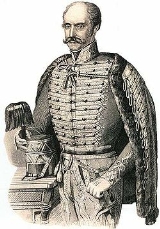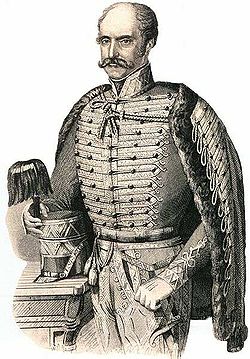
Lázár Mészáros
Encyclopedia
| General Lázár Mészáros | |
 |
|
| Date of birth | 20 February 1796 |
| Date of death | 16 November 1858 |
| Birthplace | Baja Baja, Hungary Baja is a city in , southern Hungary. It is the second largest city in the county, after the county seat at Kecskemét, and is home to around 37,000 people.... |
| Political positions |
|
General Lázár Mészáros (English: Lazarus Mészáros) (Baja
Baja, Hungary
Baja is a city in , southern Hungary. It is the second largest city in the county, after the county seat at Kecskemét, and is home to around 37,000 people....
, 20 February 1796 – Eywood, 16 November 1858), was the Minister of War during the 1848 Hungarian Revolution.
He was born into a noble family of landowners. His parents died when he was four; as a child he was moved from one relative to another. He had his schooling in Baja
Baja, Hungary
Baja is a city in , southern Hungary. It is the second largest city in the county, after the county seat at Kecskemét, and is home to around 37,000 people....
, Szabadka (today Subotica
Subotica
Subotica is a city and municipality in northern Serbia, in the Autonomous Province of Vojvodina...
), Pest and Pécs
Pécs
Pécs is the fifth largest city of Hungary, located on the slopes of the Mecsek mountains in the south-west of the country, close to its border with Croatia. It is the administrative and economical centre of Baranya county...
. Mészáros dropped out of his studies of law and joined the military. In 1813, he became Lieutenant in a cavalry regiment in Bács
BACS
Bacs Payment Schemes Limited is a United Kingdom scheme for the electronic processing of financial transactions. BACS direct debits and BACS direct credits are made using the BACS system...
County. He took part in the war against Napoleon. He was an officer of the 7th regiment of hussar
Hussar
Hussar refers to a number of types of light cavalry which originated in Hungary in the 14th century, tracing its roots from Serbian medieval cavalry tradition, brought to Hungary in the course of the Serb migrations, which began in the late 14th century....
s from 1816 to 1837; then he was put in charge of the 5th regiment of hussars. He spent 18 years in Italy
Italy
Italy , officially the Italian Republic languages]] under the European Charter for Regional or Minority Languages. In each of these, Italy's official name is as follows:;;;;;;;;), is a unitary parliamentary republic in South-Central Europe. To the north it borders France, Switzerland, Austria and...
with his regiment. Field marshal
Field Marshal
Field Marshal is a military rank. Traditionally, it is the highest military rank in an army.-Etymology:The origin of the rank of field marshal dates to the early Middle Ages, originally meaning the keeper of the king's horses , from the time of the early Frankish kings.-Usage and hierarchical...
Radetzky discovered the talented hussar
Hussar
Hussar refers to a number of types of light cavalry which originated in Hungary in the 14th century, tracing its roots from Serbian medieval cavalry tradition, brought to Hungary in the course of the Serb migrations, which began in the late 14th century....
officer, and – based on Radetzky's suggestion – he was promoted to be a colonel
Colonel
Colonel , abbreviated Col or COL, is a military rank of a senior commissioned officer. It or a corresponding rank exists in most armies and in many air forces; the naval equivalent rank is generally "Captain". It is also used in some police forces and other paramilitary rank structures...
(1845) (He also became his regiment's commandant
Commandant
Commandant is a senior title often given to the officer in charge of a large training establishment or academy. This usage is common in anglophone nations...
.)
Lázár Mészáros was a highly cultivated officer. He spoke seven languages. He was well versed in military matters, but he was also knowledgeable about society
Society
A society, or a human society, is a group of people related to each other through persistent relations, or a large social grouping sharing the same geographical or virtual territory, subject to the same political authority and dominant cultural expectations...
and the economy. In 1837, he started to correspond by mail with István Széchenyi
István Széchenyi
Széchenyi committed suicide by a shot to his head on April 8, 1860. All Hungary mourned his death. The Academy was in official mourning, along with the most prominent persons of the leading political and cultural associations...
. Mészáros was elected to be a mailing member of the Magyar Tudós Társaság
Hungarian Academy of Sciences
The Hungarian Academy of Sciences is the most important and prestigious learned society of Hungary. Its seat is at the bank of the Danube in Budapest.-History:...
(English: Hungarian Erudite Association, today: Hungarian Academy of Sciences). He chose the theme "Armed forces in modern bourgeois societies" for his inaugural.
On Lajos Kossuth
Lajos Kossuth
Lajos Kossuth de Udvard et Kossuthfalva was a Hungarian lawyer, journalist, politician and Regent-President of Hungary in 1849. He was widely honored during his lifetime, including in the United Kingdom and the United States, as a freedom fighter and bellwether of democracy in Europe.-Family:Lajos...
's suggestion Lajos Batthyány
Lajos Batthyány
Count Lajos Batthyány de Németújvár was the first Prime Minister of Hungary. He was born in Pressburg on 10 February 1807, and was executed by firing squad in Pest on 6 October 1849, the same day as the 13 Martyrs of Arad.-Career:His father was Count József Sándor Batthyány , his mother Borbála...
appointed Mészáros to be Minister of War in the first responsible Hungarian
Hungary
Hungary , officially the Republic of Hungary , is a landlocked country in Central Europe. It is situated in the Carpathian Basin and is bordered by Slovakia to the north, Ukraine and Romania to the east, Serbia and Croatia to the south, Slovenia to the southwest and Austria to the west. The...
government (22 March 1848). He took up his office after returning from Italy, where his regiment was posted (23 May). Some time later he became Major general
Major General
Major general or major-general is a military rank used in many countries. It is derived from the older rank of sergeant major general. A major general is a high-ranking officer, normally subordinate to the rank of lieutenant general and senior to the ranks of brigadier and brigadier general...
of the Imperial
Austrian Empire
The Austrian Empire was a modern era successor empire, which was centered on what is today's Austria and which officially lasted from 1804 to 1867. It was followed by the Empire of Austria-Hungary, whose proclamation was a diplomatic move that elevated Hungary's status within the Austrian Empire...
and Royal
Monarchy
A monarchy is a form of government in which the office of head of state is usually held until death or abdication and is often hereditary and includes a royal house. In some cases, the monarch is elected...
forces and the commander of Imperial troops stationed on Hungarian
Hungary
Hungary , officially the Republic of Hungary , is a landlocked country in Central Europe. It is situated in the Carpathian Basin and is bordered by Slovakia to the north, Ukraine and Romania to the east, Serbia and Croatia to the south, Slovenia to the southwest and Austria to the west. The...
territory.
Lázár Mészáros – as Minister of War – was the intellectual founder of Hungary's defensive army. In July of the same year he became parliamentary delegate of his hometown, Baja
Baja, Hungary
Baja is a city in , southern Hungary. It is the second largest city in the county, after the county seat at Kecskemét, and is home to around 37,000 people....
, as well.
From the end of August, Mészáros decided to take personal control of the southern army. He travelled to Vajdaság (Serbian Vojvodina
Vojvodina
Vojvodina, officially called Autonomous Province of Vojvodina is an autonomous province of Serbia. Its capital and largest city is Novi Sad...
). On 30 September, he returned to the capital. Mészáros was the only member of Batthyány's government who did not resign. He became the member of the Territorial Defence Committee as the Minister of War. On 13 December, he took command of the northern army with 10,000 men. On 19 January, he was discharged from his command, but he retained his post as Minister until the declaration of the Independence Statement. On 26 July, Mészáros resigned from all his remaining military functions, because he did not agree with the way Mór Perczel
Mór Perczel
Sir Mór Perczel de Bonyhád , was a Hungarian landholder, general, and one of the leaders of the Hungarian Revolution of 1848.- Life before 1848 :...
commanded the parts of the army under his control. After the Battle of Temesvár
Battle of Temesvár
The Battle of Temesvár was a battle in the Hungarian Revolution of 1848, fought on 9 August 1849 between the Austrian Empire and Hungarian Revolutionary Army supplemented by Polish volunteers. The Austrians were led by Julius Jacob von Haynau, while the Hungarians were led by Józef Bem who...
(Romanian Timişoara
Timisoara
Timișoara is the capital city of Timiș County, in western Romania. One of the largest Romanian cities, with an estimated population of 311,586 inhabitants , and considered the informal capital city of the historical region of Banat, Timișoara is the main social, economic and cultural center in the...
), and the ensuing failure of the war of independence, he left Hungary on 14 August for Turkey
Turkey
Turkey , known officially as the Republic of Turkey , is a Eurasian country located in Western Asia and in East Thrace in Southeastern Europe...
.
He settled at first in France and the United Kingdom. Then he moved to the United States, where he tried farming in Iowa
Iowa
Iowa is a state located in the Midwestern United States, an area often referred to as the "American Heartland". It derives its name from the Ioway people, one of the many American Indian tribes that occupied the state at the time of European exploration. Iowa was a part of the French colony of New...
. In October 1858, a short time before his death, Mészáros returned to England.
In his will, he requested that his remains not be returned to Hungary "until the last foreign soldier has left". He was reburied in Baja
Baja, Hungary
Baja is a city in , southern Hungary. It is the second largest city in the county, after the county seat at Kecskemét, and is home to around 37,000 people....
133 years after his death, on 15 March 1991. (The last Soviet soldiers – always seen by Hungarians as the successors of the Imperial Russian Army that crushed the Revolution 1848 – had left Hungary just months before.)
The caption of his grave in Titley, England
To the memory of
General Lázár Mészáros
Minister of war
And Commander in Chief
Of the Hungarian Army in 1848–1849.
Who was born at Baja in the county
of Bács 1796 and died at Eywood
6-th November 1858 in the 63 year of
his age and 10-th of his exile.
This stone is inscribed
by his sorrowing friend
J. E. H. Lady Langdale
Mészáros Lázár Tábornoknak,
A jó Hazafinak,
A vitéz Katonának
A nemes Barátnak
(The last sentence is in Hungarian. It means: To General Lázár Mészáros, the good Patriot, the valiant Soldier, the noble Friend.)

